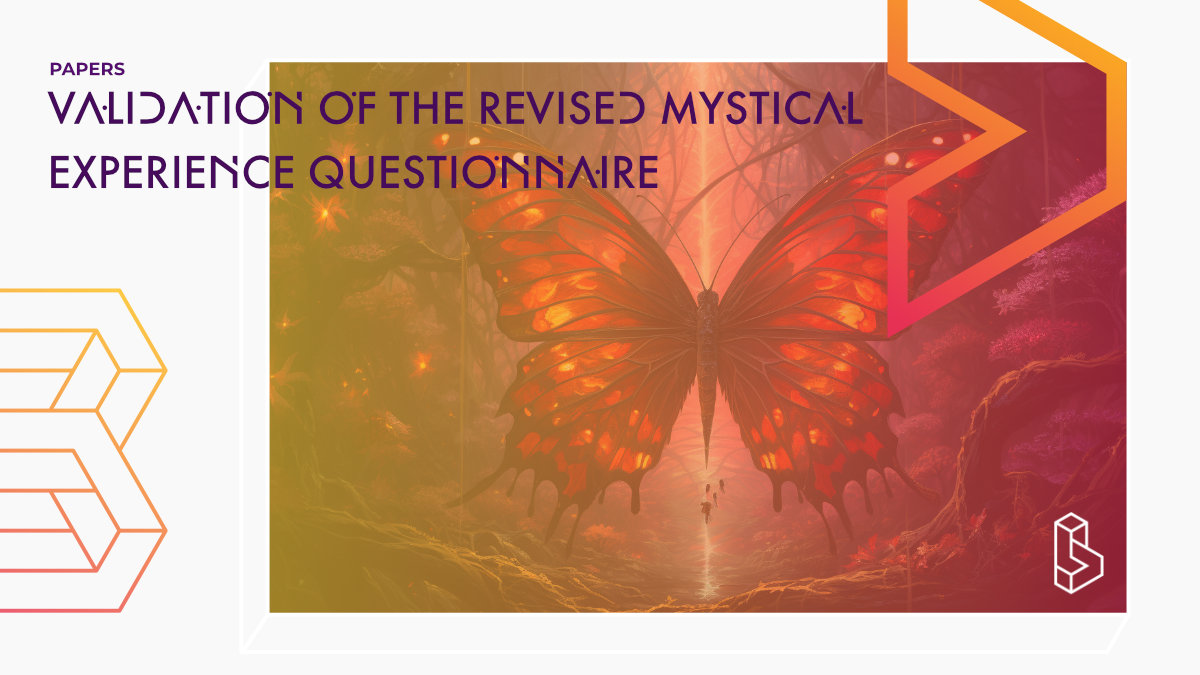This meta-analysis (2015) validates the Mystical Experience Questionnaire (MEQ30) using data from five experimental studies (n=184) with controlled doses of psilocybin (20mg/70kg).
Abstract of Validation of the revised Mystical Experience Questionnaire
“The 30-item revised Mystical Experience Questionnaire (MEQ30) was previously developed within an online survey of mystical-type experiences occasioned by psilocybin-containing mushrooms. The rated experiences occurred on average eight years before completion of the questionnaire. The current paper validates the MEQ30 using data from experimental studies with controlled doses of psilocybin. Data were pooled and analyzed from five laboratory experiments in which participants (n=184) received a moderate to high oral dose of psilocybin (at least 20 mg/70 kg). Results of confirmatory factor analysis demonstrate the reliability and internal validity of the MEQ30. Structural equation models demonstrate the external and convergent validity of the MEQ30 by showing that latent variable scores on the MEQ30 positively predict persisting change in attitudes, behavior, and well-being attributed to experiences with psilocybin while controlling for the contribution of the participant-rated intensity of drug effects. These findings support the use of the MEQ30 as an efficient measure of individual mystical experiences. A method to score a “complete mystical experience” that was used in previous versions of the mystical experience questionnaire is validated in the MEQ30, and a stand-alone version of the MEQ30 is provided for use in future research.”
Authors: Frederick S. Barrett, Matthew W. Johnson & Roland R Griffiths
Summary of Validation of the revised Mystical Experience Questionnaire
Various religious and non-religious figures have reported having mystical-type experiences, which include the experience of profound unity with all that exists, a felt sense of sacredness, a deeply felt positive mood, and transcendence of time and space.
The MEQ has been used in many studies over the past 50 or more years to assess the subjective effects and therapeutic outcomes of psilocybin ingestion. The factor structure of the MEQ43 has only recently undergone psychometric investigation.
The 30-item revised Mystical Experience Questionnaire (MEQ30) was developed and validated through factor analysis of retrospective accounts of profound experiences with psilocybin-containing mushrooms. It contains items from the previous MEQ43, but in fewer dimensions.
Find this paper
Validation of the revised Mystical Experience Questionnaire in experimental sessions with psilocybin
https://doi.org/10.1177%2F0269881115609019
Open Access | Google Scholar | Backup | 🕊
Cite this paper (APA)
Barrett, F. S., Johnson, M. W., & Griffiths, R. R. (2015). Validation of the revised Mystical Experience Questionnaire in experimental sessions with psilocybin. Journal of Psychopharmacology, 29(11), 1182-1190.
Authors
Authors associated with this publication with profiles on Blossom
Frederick BarrettFrederick Streeter Barrett is an Assistant Professor of Psychiatry and Behavioral Sciences and works at the Johns Hopkins University Center for Psychedelic and Consciousness Research.
Matthew Johnson
Matthew Johnson is an Associate Professor of Psychiatry and Behavioral Sciences at Johns Hopkins University. His research is concerned with addiction medicine, drug abuse, and drug dependence.
Roland Griffiths
Roland R. Griffiths is one of the strongest voices in psychedelics research. With over 400 journal articles under his belt and as one of the first researchers in the psychedelics renaissance, he has been a vital part of the research community.
Institutes
Institutes associated with this publication
Johns Hopkins UniversityJohns Hopkins University (Medicine) is host to the Center for Psychedelic and Consciousness Research, which is one of the leading research institutes into psychedelics. The center is led by Roland Griffiths and Matthew Johnson.

